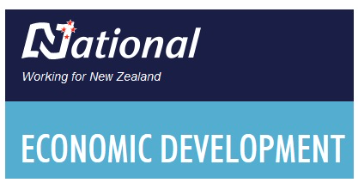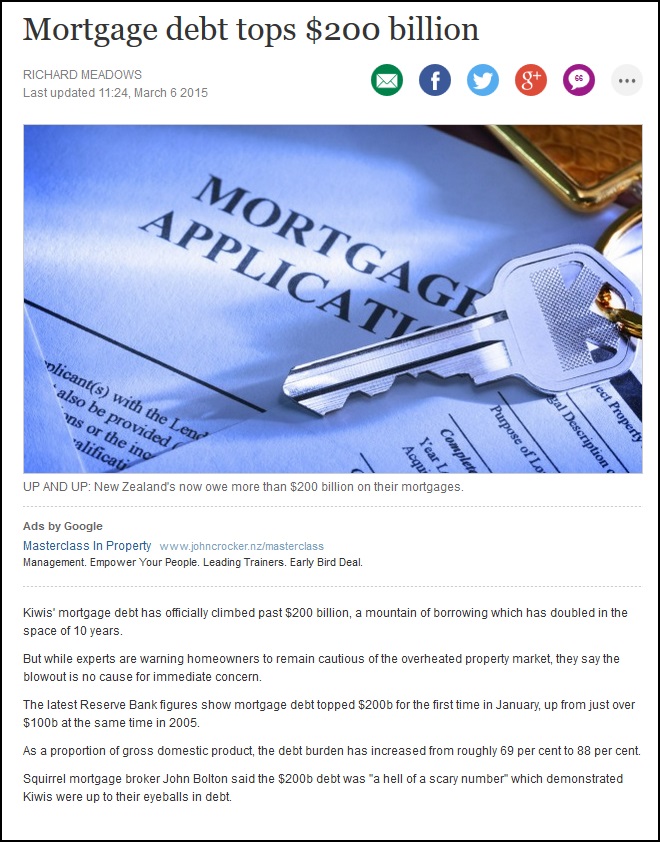.
.
Leg #1: Treasury reported in 2012, on the Christchurch re-build;
The Canterbury rebuild is expected to be a significant driver of economic growth over the next five to ten years. The timing and speed of the rebuild is uncertain, in part due to ongoing aftershocks, but the New Zealand Treasury expects it to commence around mid-to-late 2012.
Leg #2: The Reserve Bank, in 2014, on our Dairy sector;
The New Zealand dairy industry is experiencing prosperous times, continuing the strong growth in export earnings of the past eight years. Animal numbers and prices have increased and on and off farm productivity growth has been impressive. And the future looks bright. There seem to be important structural reasons behind the rise in dairy prices that should continue into the medium term.
Leg #3: Steven Joyce, Associate Minister of Finance, this year, on the Auckland housing boom;
“Closer to home, the Reserve Bank … highlights several factors continuing to support growth domestically, including robust tourism, immigration, the large pipeline of construction activity in Auckland, and, importantly, the lower interest rates and the depreciation of the New Zealand dollar.”
There we have it – the three basic “legs” comprising National’s economic development policy. One is predicated on fluctuating international market-prices; another is an unsustainable property boom funded by billions borrowed from off-shore; and the other is the epitomy of ‘disaster’ capitalism.
In debating the fragility and unsustainability of these three sectors of our economy, I (and other bloggers from the Left) have pointed out time and again the transitory nature of the dairy sector boom; the Christchurch re-build boom; and the Auckland property market boom. Acolytes of the so-called free-market – ever dedicated to their quasi-religious right-wing notions – have dismissed our warnings.
On 4 November, the National government’s Finance Minister and sheep farmer, Bill English, made a statement in Parliament that has backed up our dire warnings – albeit somewhat late in the day;
“Of course, if unemployment was a direct choice of the Prime Minister of New Zealand, there would be none of it. You would just decide to have none. But, of course, it is not. It is a product of the world economy and its low growth rates, and of particular circumstances in New Zealand where the rebuild in Christchurch has flattened out and there has been a drop in national income of billions of dollars from the decrease in dairy prices, which was always going to affect the number of jobs in New Zealand, and now it is happening.”
Indeed; “and now it is happening”.
Two of National’s economic stimulators are either belly-up, or in the process of falling flat.
Only the Auckland housing boom remains. When that collapses, it will be much, much worse than the depressed Dairying sector. At that precise moment, international lenders will have noticed that we have been borrowing-up-large for one helluva massive property splurge-party – and they will be wanting their money back.
All $200 billion of it.
.
.
According to Squirrel mortgage broker, John Bolton;
“People are completely oblivious of what’s going on. If you overlay what’s going on around the rest of the world, all bets are off.”
New Zealanders are about to wake up with the biggest “hang-over” since they first got trolleyed at teenagers.
Is this where I say, “I told you so”?
Will it matter by then?
.
.
.
References
NZ Treasury: Recent Economic Performance and Outlook (2012)
Reserve Bank: The significance of dairy to the New Zealand economy
Parliament Today: Questions and Answers – Sept 10 2015
Parliament: Hansards – Questions for oral answer – 2. Unemployment—Rate
Fairfax media: Mortgage debt tops $200 billion
Additional
Metro: 10 ideas that could solve the Auckland property crisis
Previous related blogposts
Labour’s collapse in the polls – why?
“The Nation” reveals gobsmacking incompetence by Ministers English and Lotu-Iiga
The Mendacities of Mr Key # 12: No More Asset Sales (Kind of)
.
.
.

.
.
= fs =








Sounds like a ” rock star ” economic policy to me from a govt. so out of touch and so beholding to their corporate buddies that we will continue to sink further into a deep dark unhealthy hole.
Thanks – Frank for spelling this all out for us. We already knew we had a train wreck of a govt. taking us further into debt. They are just puppets, though, following the rules and plans of those far above them because their plan sounds very familiar to what is going on in other parts of the world.
Maybe now some will study and take more seriously the topics like Agenda 21 and the N.W.O. plans and the Tavistock Institute and brilliant minds and what they are saying now like Chris Hedges; Ralph Nader; Bernie Sanders; Ken O’Keefe and of course the brilliant late great George Carlin and so many more. I bet these folks would not consider investing in the camp of the greedy; mega-corporate capitalist ” enemies of the people and the environment ” and then hypocritically speak out against them making tons ! ! of money per lecture.
I wonder if Auckland’s skyrocketing house prices has anything to do with $200 Billion of housing borrowings?
If you keep bringing wealthy migrants into Auckland requiring housing and wealthy offshore Asians buying spec properties, there is only one way for Auckland property prices to travel and that is north.
According to contacts in the Real Estate Industry things have slowed dramatically since October 1 when the new laws were introduced requiring property buyers to have IRD Numbers and NZ Bank Accounts, Auction clearances of 90% are now down to 35% so something has obviously spooked the buyers?
Very much so, Jack.
The higher that house prices go, the more banks borrow from offshore lenders to fund those spiralling house prices. Then the vendor pockets the profit. In essence, our “wealth” is predicated on borrowing money; putting it into a house; selling it to each other and voila! Instant “profit”.
It’s not wealth creation based on any productive industry like farming, tourism, manufacturing, IT, etc. It’s a money-go-round.
Prior to 1984, housing prices were (generally) kept suppressed (with the exception of the second oil shock in 1979) by banks relying solely on internal investment (savings) and lending. On top of which, vendors had to part-fund any house sale by giving the purchaser a Second Mortgage (commonly referred to as Vendor’s Finance). This not only kept house prices at a reasonable level, but it deferred profit-making to the vendor. “Delayed gratification”, if you will.
Once Douglas & Co opened up New Zealand’s banking sector to allow unfettered overseas borrowing, there was no suppressing influence on house prices. Basically Vendors could ask for whatever figure they wanted, dependent solely on the Purchaser’s ability to meet his/her/their repayments.
This not only increased house prices, but we’ve gone from being able to pay off a mortgage on one wage/salary, to a couple’s combined earnings, to now a couple-plus-a-border. In Auckland, housing prices are now so high that most cannot afford repayments in any household configuration.
When interests rates start to climb again, that $200 billion we’ve borrowed may push us inexorably into the ‘PIGS’ club.
All the really smart money have been moving into Johnson and Johnson stocks cause, you know, people still have babies in deep down turns.
Oh fu**! You mean people are human and do stuff that comes naturally?!! What a revelation!
Are we still on the cusp of something “special”?
[…] blogpost was first published on The Daily Blog on 7 November […]
Comments are closed.